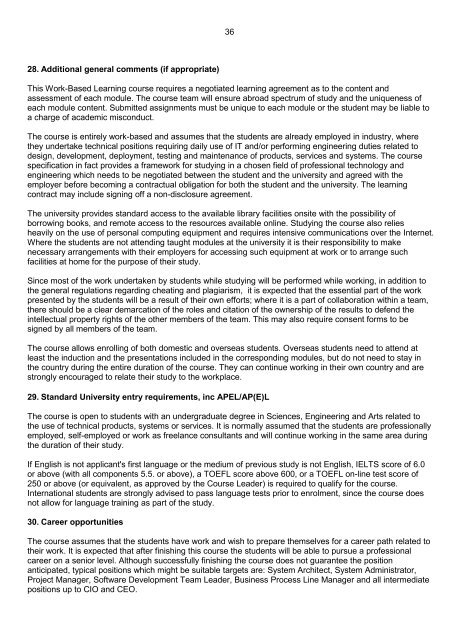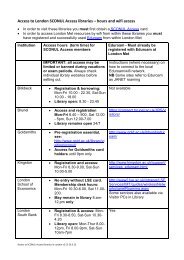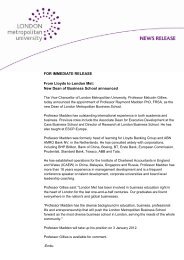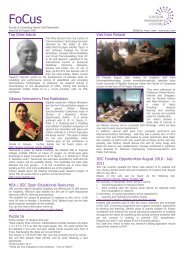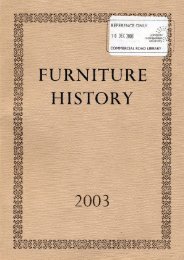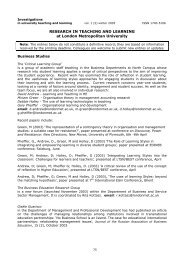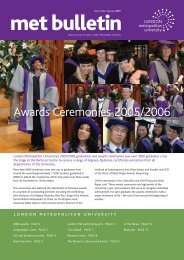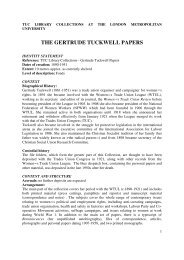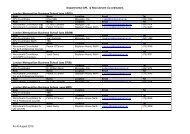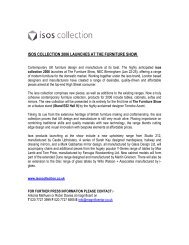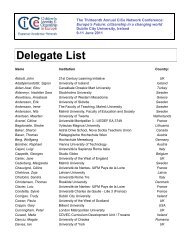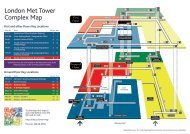prente-n - London Metropolitan University
prente-n - London Metropolitan University
prente-n - London Metropolitan University
Create successful ePaper yourself
Turn your PDF publications into a flip-book with our unique Google optimized e-Paper software.
28. Additional general comments (if appropriate)<br />
36<br />
This Work-Based Learning course requires a negotiated learning agreement as to the content and<br />
assessment of each module. The course team will ensure abroad spectrum of study and the uniqueness of<br />
each module content. Submitted assignments must be unique to each module or the student may be liable to<br />
a charge of academic misconduct.<br />
The course is entirely work-based and assumes that the students are already employed in industry, where<br />
they undertake technical positions requiring daily use of IT and/or performing engineering duties related to<br />
design, development, deployment, testing and maintenance of products, services and systems. The course<br />
specification in fact provides a framework for studying in a chosen field of professional technology and<br />
engineering which needs to be negotiated between the student and the university and agreed with the<br />
employer before becoming a contractual obligation for both the student and the university. The learning<br />
contract may include signing off a non-disclosure agreement.<br />
The university provides standard access to the available library facilities onsite with the possibility of<br />
borrowing books, and remote access to the resources available online. Studying the course also relies<br />
heavily on the use of personal computing equipment and requires intensive communications over the Internet.<br />
Where the students are not attending taught modules at the university it is their responsibility to make<br />
necessary arrangements with their employers for accessing such equipment at work or to arrange such<br />
facilities at home for the purpose of their study.<br />
Since most of the work undertaken by students while studying will be performed while working, in addition to<br />
the general regulations regarding cheating and plagiarism, it is expected that the essential part of the work<br />
presented by the students will be a result of their own efforts; where it is a part of collaboration within a team,<br />
there should be a clear demarcation of the roles and citation of the ownership of the results to defend the<br />
intellectual property rights of the other members of the team. This may also require consent forms to be<br />
signed by all members of the team.<br />
The course allows enrolling of both domestic and overseas students. Overseas students need to attend at<br />
least the induction and the presentations included in the corresponding modules, but do not need to stay in<br />
the country during the entire duration of the course. They can continue working in their own country and are<br />
strongly encouraged to relate their study to the workplace.<br />
29. Standard <strong>University</strong> entry requirements, inc APEL/AP(E)L<br />
The course is open to students with an undergraduate degree in Sciences, Engineering and Arts related to<br />
the use of technical products, systems or services. It is normally assumed that the students are professionally<br />
employed, self-employed or work as freelance consultants and will continue working in the same area during<br />
the duration of their study.<br />
If English is not applicant's first language or the medium of previous study is not English, IELTS score of 6.0<br />
or above (with all components 5.5. or above), a TOEFL score above 600, or a TOEFL on-line test score of<br />
250 or above (or equivalent, as approved by the Course Leader) is required to qualify for the course.<br />
International students are strongly advised to pass language tests prior to enrolment, since the course does<br />
not allow for language training as part of the study.<br />
30. Career opportunities<br />
The course assumes that the students have work and wish to prepare themselves for a career path related to<br />
their work. It is expected that after finishing this course the students will be able to pursue a professional<br />
career on a senior level. Although successfully finishing the course does not guarantee the position<br />
anticipated, typical positions which might be suitable targets are: System Architect, System Administrator,<br />
Project Manager, Software Development Team Leader, Business Process Line Manager and all intermediate<br />
positions up to CIO and CEO.


